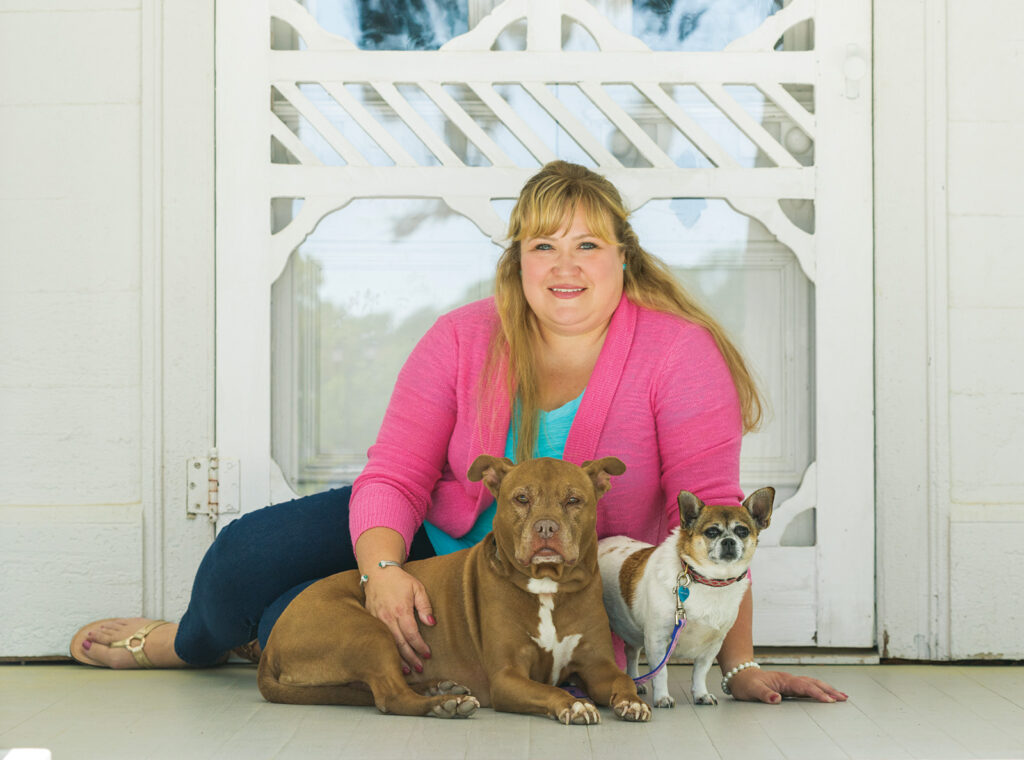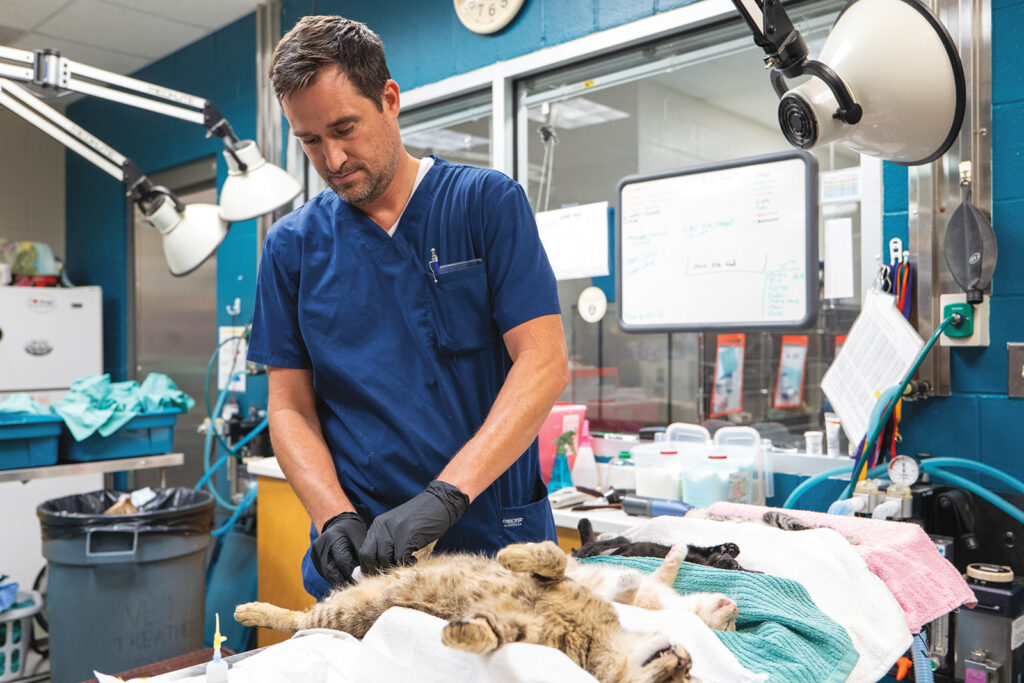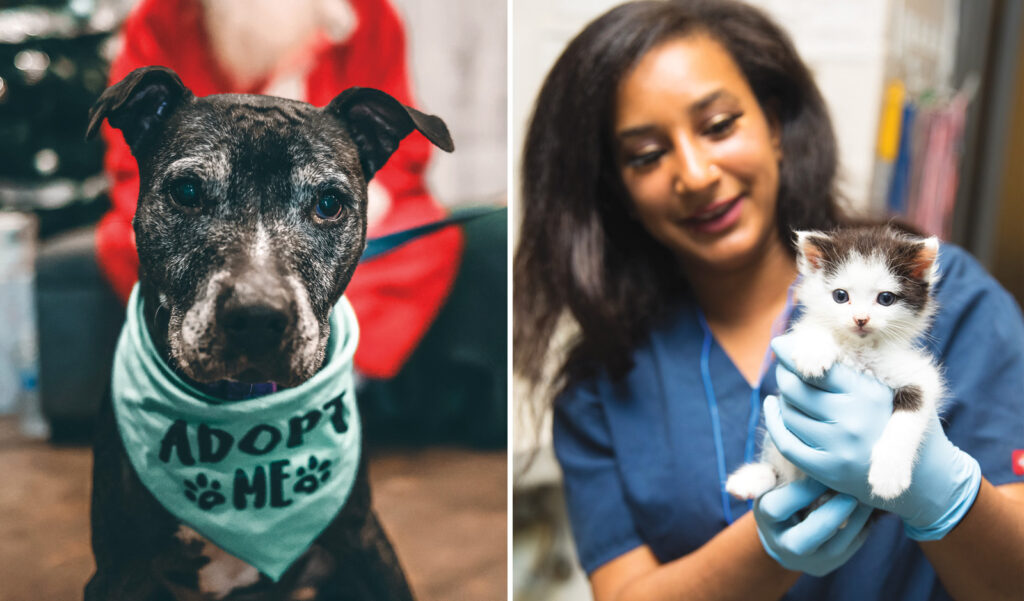Article:
BY MARIO BOUCHER
The power of a pet’s unconditional love can change lives. “I was going through a very difficult time in my life [when] I visited the SPCA of Wake County to consider adopting a pet,” recalls Samantha Ranlet, a spokeswoman for the Society for the Prevention of Cruelty to Animals of Wake County. “That day, I came home with the first dog I ever had in my life, and she was the light at the end of the tunnel for me. She gave me hope and she turned things around in a big way. Soon after, I decided I wanted to join the organization myself.”
Wake County Animal Services Director Jennifer Lynn Federico had no idea how pets would impact her life. “I now have six dogs at home,” she says. “It wasn’t a good fit for me to work in a corporate environment. I like working with people and talking about their pets. Helping to rescue pets can mean a lot of things. It can be helping animals in tough situations, like a dog that survived a fire that killed a family.”
Ranlet understands the impact one animal can make on its owners. “Every time I see pets come through our doors, they remind me of my dog and everything she means to me, and I imagine a pet contributing to a family’s life,” Ranlet says. “We look for people with good expectations because it is a lot of responsibility, and some pets have special needs. We want to make sure it is a good fit for the family and the pet as well.”
A pet’s unconditional love and playful nature can also help their owners deal with depression. “There is something very profound about having a pet around that can calm you down,” Ranlet says.
In order to bring pets into forever homes, local pet rescue organizations have a heavy weight to bear. According to the North Carolina Department of Agriculture and Consumer Services, North Carolina has the third-highest rate of animal shelter euthanasia in the country. “We partner with many animal control facilities that do not have the resources to provide the care needed to get animals ready for adoption,” says Molly Goldston, founder and executive director of Saving Grace Animals for Adoption in Raleigh.
Before you adopt, make sure you aren’t in a situation that may force you to rehome your pet. “If you are moving, consider what you need to plan for to take your pet with you,” Federico says. “If you are having a baby, prepare your dog in advance by working with a trainer. The Animal Center has routinely been booked out four to six weeks for an owner wanting to surrender their pets.”
Affordable pet care and spay/neuter services in North Carolina, especially in areas where these services are needed most, is still not often accessible. “In Wake County, we take for granted how accessible things may be for us. This can be very different
in a neighboring county,” Goldston says. “Rescues and shelters vary in their adoption process, and it is worth taking the time to find what works for you and the pet that will be your family.”
LEARN MORE
Wake County Animal Center
wake.gov/departments-government/animal-services
919.212.7387
SPCA Wake County
spcawake.org
919.772.2326
Saving Grace Animals for Adoption
savinggracenc.org
919.518.1180
Safe Haven for Cats
safehavenforcats.org
919.341.4127

LOCAL PET RESCUE SERVICES
Wake County Animal Center offers spaying/neutering, some elective surgeries, medical assessments and treatments for all animals. Other programs involve volunteers who help with everything from cat cuddling to dog walking, foster pet care and even assisting with a barn cat program that incorporates spaying or neutering, ear tipping, and vaccination.
SPCA of Wake County is an independent animal welfare shelter that relies on donations in order to transform the lives of pets and people through protection, care, education and adoption. Its services include spaying/neutering, basic pet vaccines and preventative care, and delivery of pet food and supplies for home-bound, low-income seniors. SPCA Wake also works with the local community to reduce cat overpopulation by rescuing and adopting kittens.
Saving Grace Animals for Adoption is a nonprofit funded entirely by donations. It employs a volunteer staff charged with caring for about 4,000 dogs each year. From intake to adoption, dogs are cared for by a support system of committed fosters and volunteers. All animals are spayed or neutered, vaccinated, dewormed and microchipped. Any dog that tests positive for heartworms receives full treatment.
SAFE Haven for Cats is a nonprofit, no-kill animal shelter dedicated to finding homes for homeless cats and kittens. Since opening, SAFE Haven for Cats has orchestrated the adoptions of more than 10,000 cats and kittens, and spayed or neutered more than 30,000 animals. The organization can accept stray cats that are able to be picked up and handled safely, and feral cats that are 6–10 weeks old.

CANCER SCREENING FOR PETS
According to the American Veterinary Medical Association, one in four dogs will develop cancer. “The best way to stay ahead of any diseases, including cancer, is to make sure your pet stays up-to-date on vaccinations, gets routine bloodwork to check for early abnormalities, maintains an ideal weight and gets annual veterinary exams,” says Wake County Animal Services Director Jennifer Lynn Federico.
Regular screening is key. “Certain cancers in pets can develop without displaying overt or obvious symptoms, and regular screening with a veterinarian can identify warning signs early so that pets can receive timely and effective treatment,” Ranlet says.
Chan Namgong, a pioneer in the early detection of cancer in canines at North Carolina State University’s Centennial Campus, is founder and CEO of Raleigh-based Animal Cancer Dx, which employs a team of veterinarians, scientists and entrepreneurs committed to early detection of cancer in dogs. The company has developed a noninvasive, highly accurate and cost-effective cancer detection method. Namgong started his business for personal reasons. “After my mom was diagnosed with breast cancer, I read a lot about cancer detection and cancer treatment,” he says.
Namgong’s research included reading a peer-reviewed journal article on how scientists used caenorhabditis elegans to detect cancer in human urine. “C. elegans,” as they are typically referred to, are a species of nematode worm with an elongated, cylindrical body that are frequently chosen as a model to study human diseases. “I wanted to run a proof-of-concept in the veterinary space, which didn’t have any cancer screening test options at that time,” Namgong says.
Half of all canine cancers are treatable if caught early enough, and new treatments are continuously being researched, Namgong says. Animal Cancer Dx’s Oncotect cancer-screening test for dogs has won several awards and grants in developing a one-of-a-kind, non-invasive, multi-cancer screening test using canine urine, Namgong says. “It’s accurate, affordable and convenient.”

KEEP YOUR PETS HEALTHY
Visiting a veterinarian annually is the first step in keeping your pet healthy. “Having pets spayed and neutered reduces the risk of pets developing certain types of cancers or ailments, and also reduces the odds of [pets] escaping and being injured while running astray,” says Samantha Ranlet, a spokeswoman for the Society for the Prevention of Cruelty to Animals of Wake County.
Other suggestions for keeping your pets healthy and safe include:
- Vaccinating them against diseases like distemper, Bordetella and rabies, which is required by law
for dogs, cats and ferrets. - Prioritizing food management. Don’t share table food; it can be toxic and cause severe illness or even death. Overfeeding can lead to obesity, heart disease and arthritis.
- Keeping dogs on a monthly heartworm treatment so they can enjoy the outdoors without developing heartworm disease, which is a common and life-threatening condition.
- Having your pet microchipped with the correct contact information and making sure you always keep your contact information up-to-date.
- There is no statewide leash law in North Carolina, so check your county’s laws to make sure you
are in accordance with those specific regulations.
- Vaccinating them against diseases like distemper, Bordetella and rabies, which is required by law



